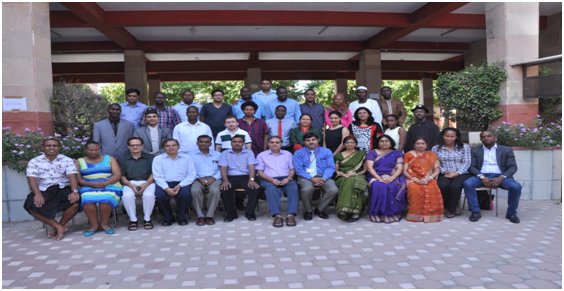(1) Certificate Programme in Monitoring & Evaluation (International Programme)
DETAILED PROGRAMME DESIGN AND STRUCTURE (Tentative and indicative) :
The duration of the programme is three months. The details of the programme are as below:
Coverage
Module I: Monitoring & Evaluation: An Overview of Concepts, Issues and Trends
1. Concepts of developmental planning, research and evaluation research, audit and social audit, Project Cycle
2. An overview of Concept of monitoring & evaluation, importance of M&E, difference between M&E, scope, objectives, Principles and their inter dependence.
3. Relationship between Plan Formulation, implementation and M&E.
4. Monitoring and Evaluation in India
5. Evaluation as an emerging discipline.
6. District Planning and role of M&E
7. The need and role of professional monitors and evaluators.
Module II: The Purpose and Building Blocks of Monitoring Process: Models and Techniques
1. Monitoring and its process
2. Components and indicators of monitoring
3. Stakeholder Analysis
4. Techniques of monitoring such as PERT, CPM, Gantt Chart; Relative importance and application of techniques
5. Result based monitoring & evaluation
6. Concept of Clusters development and M&E.
Module III: Architecture of Evaluation: Theoretical Perspective, Rationale, Emerging Approaches
1. Importance of Evaluation and its utility.
2. Various types of evaluations
3. Recent Approaches to Evaluation and their applicability.
4. Evaluation theories and models--Theory of change, logic models, etc.
5. Evaluation with focus upon social equity and gender equality
6. Participatory evaluation and techniques
7. Outsourcing of evaluations and preparation of TORs
8. Impact Evaluation
9. Social Audits and Citizen Report Card
Module IV: Methodological Aspects: Sampling, Evaluation Models and Designs, Quantitative and
Qualitative Approaches
1. Quantitative and qualitative evaluation designs and their applicability
2. Sampling techniques in evaluation
3. Development of tools for data collection
4. Techniques of Data Analysis
5. International Experience in M&E (By participants)
6. MIS system and software packages
Module V: Reporting, Presentation Skills and Dialogue
1. Report writing
2. Communication of Results
3. Current Debate- Utilization of Evaluation Results, Need for Evaluation Policy, etc.
4. Ethics & Standards
5. Management of Evaluation and Planning of Risks
The above content will include hands on sessions, participants’ presentations, exercises, field visits, experience sharing, case studies discussions, assignments, workshops and periodic tests.
PROJECT WORK
Participants are required to take up a project on a topic chosen within the frame work of the programme and develop a report. Participants may bring necessary data information that could facilitate their project work. Projects are taken by forming various groups.
STUDY TOURS/FIELD VISITS
An integral part of the programme is its study tour/ field visits that are scheduled in the programme. Participants would be taken to academic / professional organizations. Such visits allow the participants to have first hand information and experience in approaches, techniques and practices being followed in M&E.

Group Photograph of Participants of Diploma in M&E with NILERD Faculty
Participants of Diploma in Monitoring & Evaluation during group activities
(2) National Training Programme in Monitoring & Evaluation
One-week training programmes are designed as per the need of the State Governments to train their officials covering various aspects of M&E. The programme contents are flexible and modified in consultation with the requirements of the participants.
Objectives of the Programme
1. To appreciate the importance of M&E as a management tool
2. To understand the basic concepts, methodological aspects and practical procedures of M&E;
3. To know about various evaluation designs and determine the appropriate designs in the context of requirements and resources;
4. To develop expertise in data collection techniques; and
5. To have expertise in M&E for further dissemination of knowledge as a trainer.
Contents
1. Overview of Monitoring & Evaluation
2. Techniques of Monitoring
3. Recent Approaches of Evaluation
4. Impact Evaluation and Evidence based Policy Planning
5. Evaluation Design
6. Sampling
7. Evaluation Models
8. Report Writing

 Screen Reader Access I
Skip to Main Content
I
Font Size
I
Screen Reader Access I
Skip to Main Content
I
Font Size
I



 Youtube
Youtube


